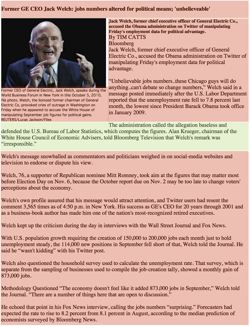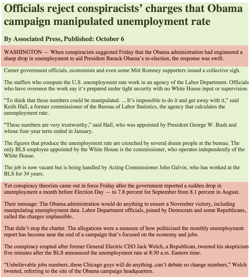NEW HAMPSHIRE — Media ethics pop quiz: When conspiracy theories started circulating on Twitter claiming that Friday’s jobs report had been politically manipulated, what should reporters have done?
(a) Avoid covering a baseless and unsubstantiated charge and focus instead on the mainstream debate over the meaning and significance of the jobs report.
(b) Carefully cover the conspiracy theory as news, making clear that no credible evidence exists to support the claim.
(c) Write up “he said,” “she said” news reports that treat the conspiracy theory as a matter of partisan dispute.
One can make a reasonable case for either (a) or (b), but several outlets chose (c) instead, writing up the charges in a format that is likely to help spread the myth and encourage more like it in the future. With incentives like these, should we be surprised that politicians and commentators keep making false claims?
The conspiracy theory was sparked by former General Electric CEO Jack Welch. After the jobs report was unexpectedly favorable for President Obama, Welch took to Twitter to make an evidence-free accusation that the administration had doctored the numbers, which are produced by the highly respected and politically insulated Bureau of Labor Statistics (BLS). Other anti-Obama conservatives quickly parroted the implausible charge, which was then discussed widely on Twitter and cable news.
The most significant damage was done, however, when the meme jumped to mainstream news coverage and was treated credulously by reporters and commentators, who often framed it as a plausible contention that was in dispute between the parties. In particular, the lede to an appalling ABCNews.com story by Abby Ellin appeared to give credence to Welch’s claim. Ellin stated that the surprisingly large decrease in unemployment “has raised suspicions that the White House might be cooking the books ahead of the election” and then spent five additional paragraphs detailing the charges before bothering to start refuting the claim in the seventh paragraph:
The U.S. unemployment rate unexpectedly fell to a near four-year low of 7.8 percent in September, the lowest since President Obama took office. Most economists were expecting a slight rise, so the number has raised suspicions that the White House might be cooking the books ahead of the election next month.
Jack Welch, the former CEO of General Electric, quickly came out with a tweet, voicing his suspicion. On his Twitter account he accused the Obama administration of manipulating U.S. employment data for political advantage.
“Unbelievable jobs numbers…these Chicago guys will do anything…can’t debate so change numbers,” said Welch, 76 and a Republican.
Other GOP members also blasted the numbers.
“In regards to today’s Jobs report—I agree with former GE CEO Jack Welch, Chicago style politics is at work here,” Florida Rep. Allen West wrote.
“No, there’s nothing at all curious about the last jobs report diving to 7.8 percent unemployment before the election,” said Keith Urbahn, Donald Rumsfeld’s former chief of staff.
(To be fair, not all GOP members felt something underhanded was going on. As former Bush White House aide Tony Fratto put it, “BLS is not manipulating data. Evidence of such would be a scandal of enormous proportions & loss of credibility.”)
Another ABCNews.com story described the report as an “October surprise” —a term that usually connotes pre-election dirty tricks—and failed to directly refute claims it briefly described as “conspiracy theories,” while a Reuters report framed the dispute as a “he said,” “she said” dispute between Welch and his critics, even giving him the last word.
By contrast, both the Associated Press and Politico stood out for their excellent coverage of the controversy, which emphasized that the belief was a fringe notion that was not widely held in the mainstream. One version of the AP story, which was written by Christopher S. Rugaber and Scott Mayerowitz, invoked conspiracy theories about Sasquatch, the Kennedy assassination, and the staging of the moon landing in its lede. In a subsequent version, Rugaber and Mayerowitz described the advocates of BLS manipulation as “conspiracists” and noted in their lede that “[c]areer government officials, economists and even some Mitt Romney supporters” found the claim implausible, including the outgoing commissioner of the BLS, a Bush appointee, who they quote stating that it would be “impossible” to manipulate the numbers. Similarly, Politico’s Patrick Reis emphasized the bipartisan consensus that the charges are bogus. Under the headline “The jobs number truther movement,” Reis emphasized in his lede that “Republicans who have worked with the jobs numbers” think the charges are “[b]unk,” quoting unequivocal denunciations from a former chief economic adviser to President George W. Bush and a Bush spokesperson.
Here in New Hampshire, the news was not much better. While the sober-minded Concord Monitor, which tends to avoid the worst excesses of national politics, did not cover the conspiracy theories, the Union Leader, the state’s largest newspaper, paired a straight front-page news article on the implications of the jobs report for the state with an awful Bloomberg story by Tim Catts that also appeared on the Boston Globe‘s Politics page online (A Bloomberg News business story that ran on B06 of the Union Leader did briefly quote an economist calling Welch’s theory “absolutely garbage.”) The Catts story re-states Welch’s claim in the lede without providing any clue to readers that it is false, and largely portrays the matter as one that is in dispute between Welch, a Romney supporter, and the Obama administration. Similarly, the Globe ran a print article on the jobs report by Matt Viser that quoted Welch’s conspiracy theorizing without bothering to rebut it.
The Bloomberg story that appeared in the Union Leader and on BostonGlobe.com provides an instructive contrast with the AP story. Consider the images below (click to enlarge), which use highlighting to contrast the relative emphasis given by these two stories to specifying Welch’s baseless claims (in red) versus raising questions and reporting criticisms (in green):

|

|
We saw the same pattern in coverage of the phony “investigation” of President Obama’s birth certificate by Maricopa County, Arizona sheriff Joe Arpaio and Senate Majority Leader Harry Reid’s unsubstantiated claims about Mitt Romney not paying taxes for ten years. In both cases, some journalists covered these claims skeptically, while others simply repeated the charges in a “he said,” “she said” style that is likely to disseminate the myths more widely and increase misperceptions.
Reporters shouldn’t be expected to avoid covering controversial claims in the news, but they can exercise judgment in the way they report on those claims. In doing so, the media can weaken the incentives for political elites to promote misinformation rather than amplifying the worst aspects of “freak show” politics.
Brendan Nyhan is an assistant professor of government at Dartmouth College. He blogs at brendan-nyhan.com and tweets @BrendanNyhan.
